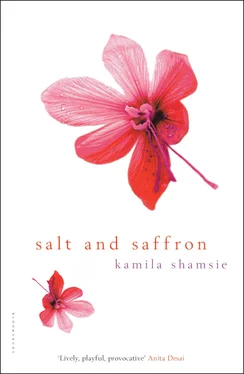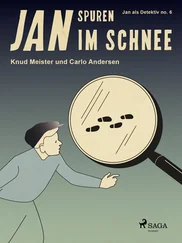‘Do you cook vats of your murgh mussalum to give him a taste of Dard-e-Dil?’
‘As a matter of fact, yes. But the last time he came to see me, just a few months ago, he brought over, oh my mouth waters at the thought of it, shami kebabs that were positively Masoodian.’
‘Impossible.’
‘I’m not joking. He said they were from a new restaurant in Istanbul that is driving everyone mad! Apollo tasted them and suggested we move to Turkey.’
I was trying very hard not to clutch at straws and pull them together as though they were jigsaw pieces which would form a clear picture if I just got the edges right. I was trying very hard.
‘What’s the name of the restaurant?’
Meher Dadi shrugged and stood up. ‘Don’t know. Suppose I could find out.’
‘Please.’
She looked at me sharply. ‘Why?’
‘Please.’ I thought my heart might explode.
‘All right. If you insist.’
I handed her Dadi’s mobile phone.
‘Now? And on a mobile? That’ll cost absurd amounts of money.’
‘Bonnets. Bees. What can one do? I’ll reimburse Dadi.’
She checked her watch and calculated the time difference, took the phone and dialled. ‘Apollo?’ she said, and reeled off strange syllables. For some reason I’d always imagined they spoke English to each other.
Why is it that when people speak in a language you can’t understand they think all meaning is lost on you? If she’d been speaking in English she’d have lowered her voice, kept it steady, but in Greek she allowed all emotions to write themselves across her face and in her tone. That she missed him, that Dadi’s fall had given her a fright, that she and Dadi had spent the evening reminiscing with tears and with laughter, that I had some strange notion in my head which required him to find out the name of a restaurant — all this I heard without understanding a word.
She said goodbye, repeated how much she missed him, and handed the phone to me.
‘He’ll make enquiries. But in return he wants you to promise to come and visit.’
‘Definitely.’
She kissed me on the cheek and left me alone with Dadi. I tried not to think absurd thoughts. It didn’t work. I enumerated all the reasons why I shouldn’t pole-vault to the conclusion which suggested itself to me, but that entailed thinking about the conclusion, and my heart couldn’t bear it. I walked around, hummed, tried to remember as many songs from the eighties as possible, took out pencil and paper to help me work out which movie I knew more lines from: The Wizard of Oz or Casablanca. Oz won hands down, even after I excluded all the musical numbers.
And just as I was about to give up and allow myself to see that jigsaw picture, the door opened.
An old, slightly stooped man walked in. His hair was white, but thick; his face was a mass of wrinkles, though his jowls were only beginning to droop. His sherwani was exquisitely cut and, together with the silver-handled walking stick in his hand, conferred on him an air of great dignity.
‘Abida.’ He hadn’t even seen me.
Dadi, who had slept soundly through her sister’s chatter, woke up with a start.
Her hand went to her mouth to stifle a scream.
‘Akbar?’
The man shook his head.
‘Taimur, Taimur. You’re not dead, you’re not.’
The man shook his head again and walked forward into the moonlight. ‘I was always third on your list, Abbie.’
‘Sulaiman …’
In Book VIII of The Odyssey a bard at the court of King Alcinous entertains the assembly with tales of the crafty Odysseus, hero of the Trojan war, beloved of the grey-eyed goddess, wanderer in search of a way home. Before the bard has finished his tale a stranger weeps and is asked to identify himself. He says, ‘Behold Odysseus!’
Imagine how the bard must have felt to see before him that legendary figure whose name was more familiar on his tongue than the names of his own children. Imagine that, and you might begin to understand how I felt when I saw Sulaiman. I had always assumed that he was, like Taimur and Akbar, a man from another age, mythical, our lives not destined to overlap. His presence, just feet from me, had to be a trick or an apparition. How could he be alive when his brothers had been dead so long?
‘Look at you.’ His voice was strangely familiar; I had heard something like it many times when Aba imitated his own father’s voice with all its velvety softness. He propped his cane against a chair and sat down on Dadi’s bed. ‘Look at you. I thought I never would.’
Dadi’s hands trembled across his face. She touched a white scar at the corner of his mouth. That was where Akbar had punched him so many years ago. She clenched her hands and sat back. ‘Why now?’
‘Because we’re dying. We can’t rely on tomorrows.’
Dadi patted her hair. ‘You could have waited for one more tomorrow. I look quite good for my age, you know, when I have a little time to get dressed and put on some make-up.’
Sulaiman laughed. I liked his laugh; it hinted at a vast capacity for delight. ‘The vanity of Abida. Still unchecked.’
‘The same can’t be said of the Naz of Abida.’
‘No one has ever had more right to Naz than you.’
Dadi patted his hands. ‘Where shall we begin? Not with apologies.’
‘No, never with that. With an answer to your question. Why now? Because I was just in London, where my charming great-niece, Rehana, introduced me to my even more charming great-niece, Samia, and both of them then proceeded to give me an absolute earful for my stubbornness, called up a travel agent, and gave me your address. They had everything organized, from connections at the visa office to a car driven by Meher’s grandson waiting for me at Karachi airport. Poor Mohommed nearly fainted when he saw me.’
Dadi waved her hands. ‘Those details can wait. Tell me about you, Sulaiman. Tell me about, oh, everything. You have children? Grandchildren?’
Sulaiman touched her knee. ‘Abida, did he hate me to the end?’
‘So you know he died.’
‘Yes. I heard about it just weeks after it happened. Someone who knew someone who knew someone in Karachi told me. Tried to find Taimur after that, but nothing. Then I heard that his daughter was here and that Taimur, too, was dead.’
‘Sulaiman, that someone in Karachi was me. I saw to it that you were notified. I was sure you would come. I was sure at the very least you would write.’
‘I was sure you would write. Besides, it was nineteen seventy-one. There was a war on. And after that, as I said, you keep waiting for tomorrow. Did Akbar hate me to the end?’
‘Your name, and Taimur’s, were the last words on his lips.’
I think he knew she was lying. He looked at her as if to say that Akbar’s last words couldn’t possibly have been about anyone other than her.
‘Abida, there’s something I should have told you long ago. Something about Taimur.’
What he told her was this: when Abida and Meher’s parents returned to Dard-e-Dil in 1938, after a year of living in Delhi, Akbar and Taimur and Sulaiman took one look at their childhood playmate, the erstwhile tomboy Abida, and did a triple take. The other girl-cousins had become women at the ages of fifteen or sixteen (in Baji’s case, closer to fourteen), but Abida had bided her time, waiting for a moment when her transformation could be extraordinary. And it was. The wonder of it, Sulaiman said, was not that Taimur and Akbar had fallen in love with her, but that he hadn’t. Perhaps, he said, he had, but he kept it buried because right from the start he saw that if she were to make a choice between the three of them she’d have no difficulty in reducing the list to two.
Читать дальше












